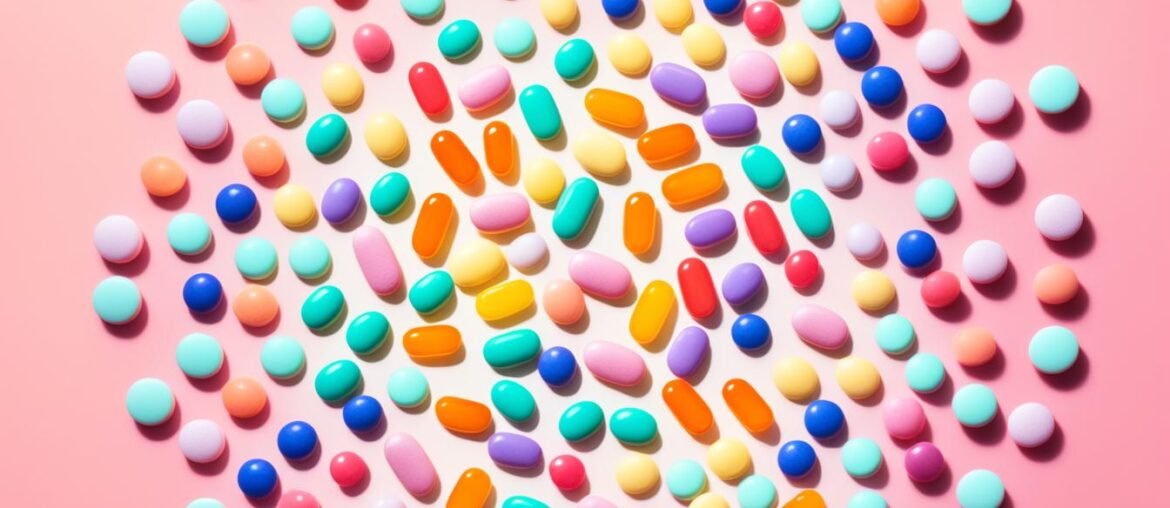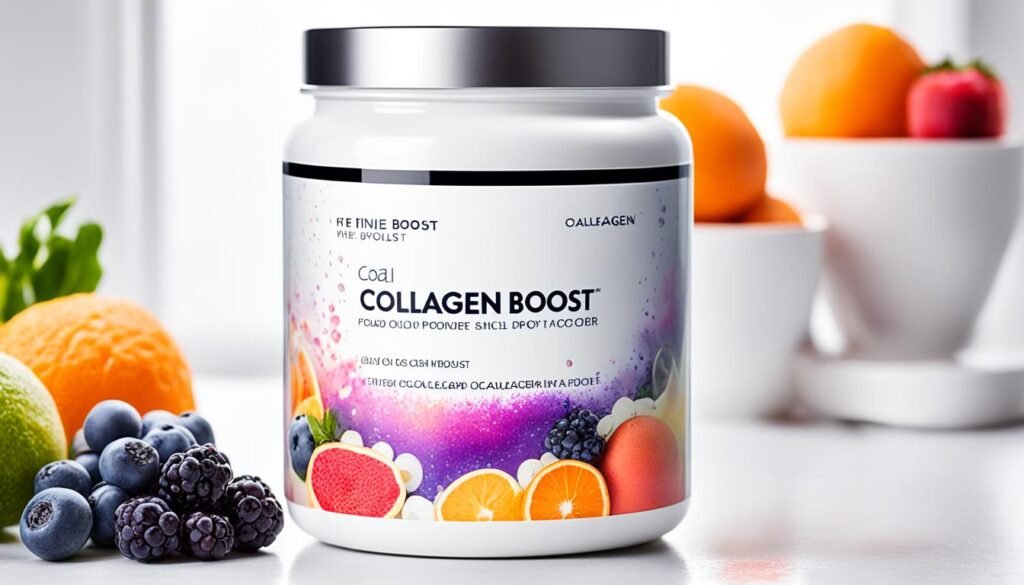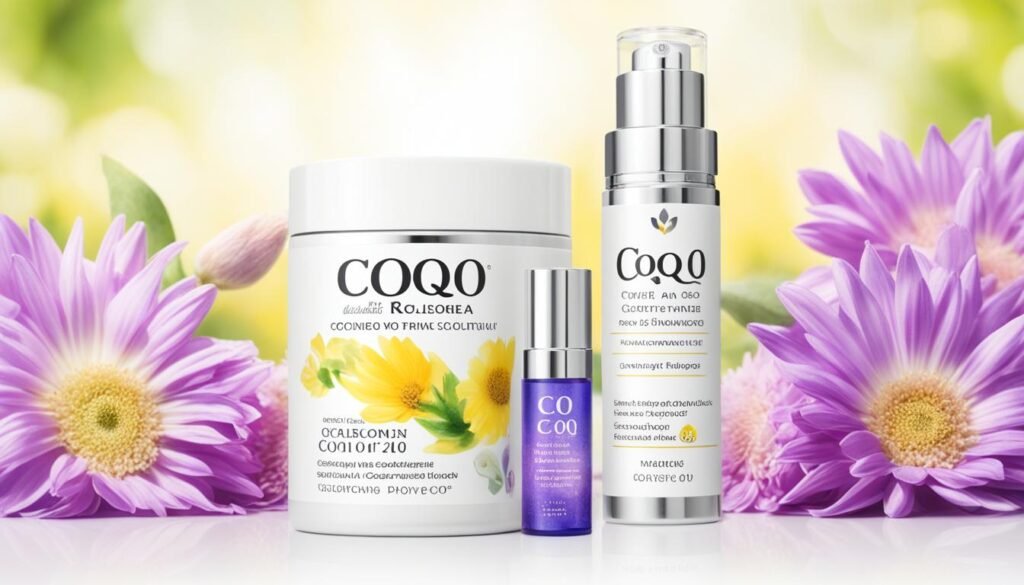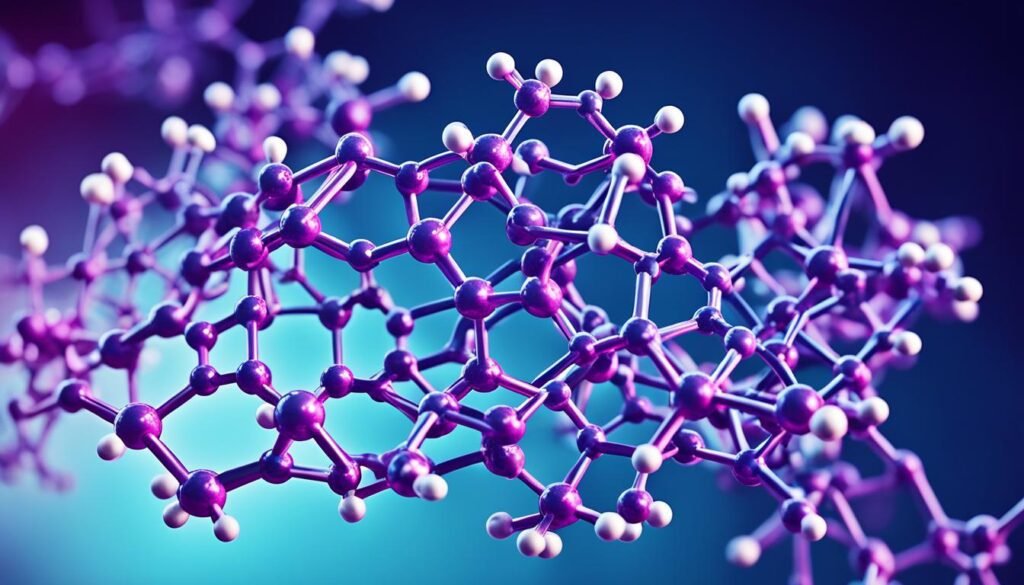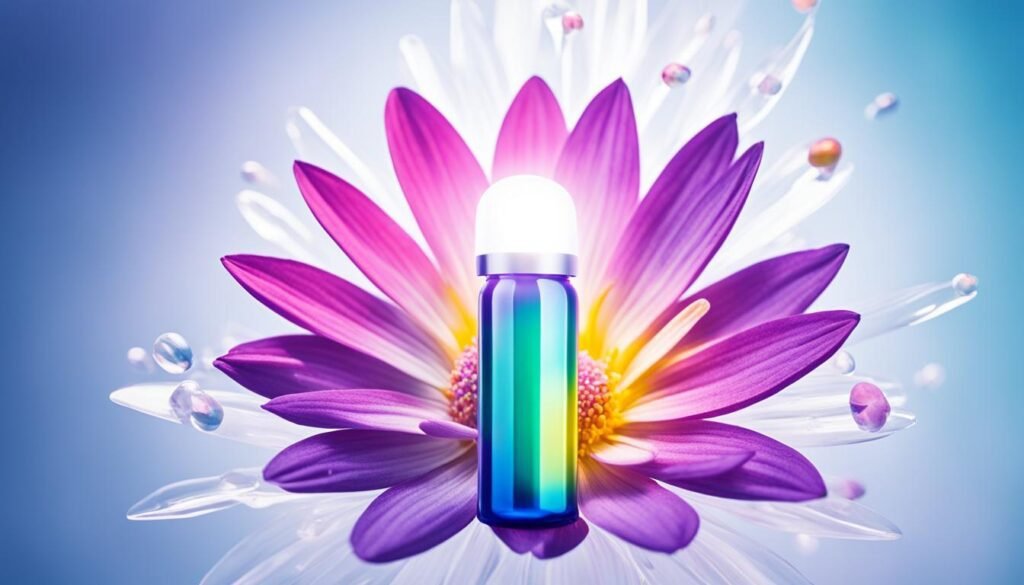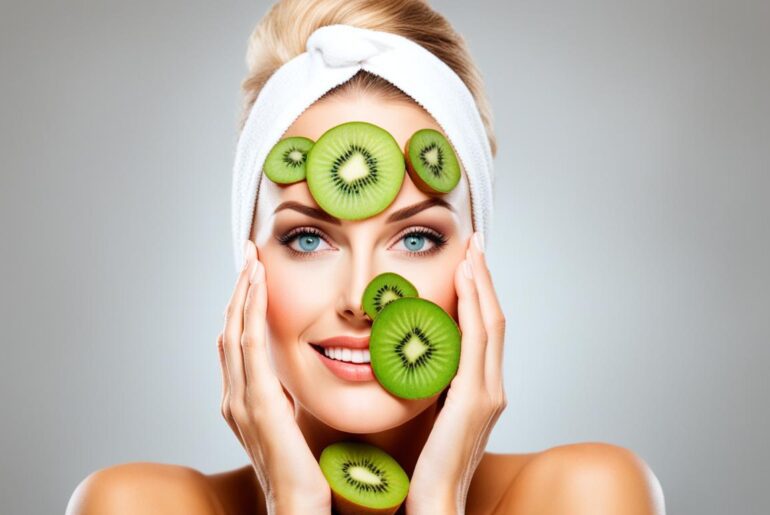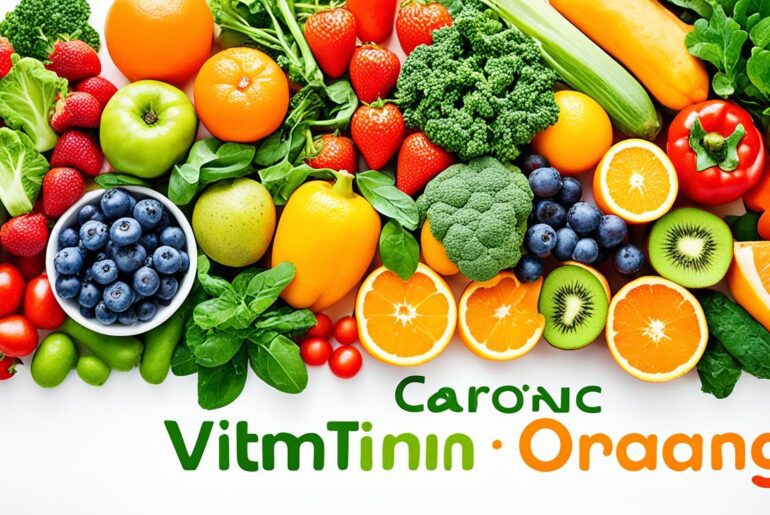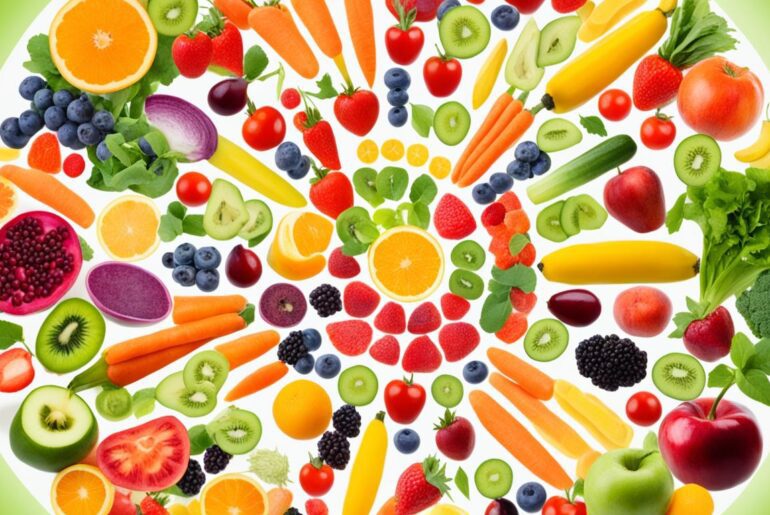Are you tired of spending a fortune on antiaging creams that promise miraculous results? Have you ever wondered if there’s a better way to achieve youthful, radiant skin? Look no further. In this article, I will reveal the truth about skin health vitamins and how they can transform your aging skin. Prepare to be amazed as we challenge common beliefs and explore the best vitamins for skin health. Get ready to unlock the secrets to a more youthful and vibrant complexion.
Key Takeaways:
- Discover the three antioxidants that can effectively decrease the damage caused by the sun on your skin: selenium, vitamin E, and vitamin C.
- Learn how selenium protects your body from skin cancer caused by sun exposure.
- Explore the role of vitamin E in protecting cell membranes and reducing sun damage.
- Understand how vitamin C repairs free radicals and prevents them from becoming cancerous or accelerating the aging process.
- Unveil the secrets of other skin health vitamins, including curcumin, EGCG, collagen, CoQ10, and nicotinamide riboside, and how they can contribute to a more youthful complexion.
The Role of Selenium in Skin Health
Selenium plays a crucial role in maintaining skin health and protecting against the harmful effects of sun exposure. Its powerful antioxidant properties help safeguard the body from skin cancer caused by UV radiation. Additionally, selenium helps preserve tissue elasticity and inhibits the aging process associated with oxidative damage.
Dietary sources rich in selenium include whole grain cereals, seafood, garlic, and eggs. By incorporating these foods into your diet, you can naturally boost your selenium intake and promote skin health.
Animal Studies on Selenium and UV Damage
Animal studies have demonstrated that selenium, whether administered orally or applied topically, provides effective protection against both everyday and excessive UV damage. These findings highlight the vital role of selenium in preventing sun-related skin deterioration and cancer development.
Selenium and Skin Health Supplements
For those looking to enhance their selenium intake, skin health supplements enriched with selenium are readily available. These supplements offer a convenient and reliable way to ensure adequate selenium levels for optimal skin health.
Integrating selenium into your skincare routine may significantly contribute to the overall well-being of your skin.
| Dietary Sources of Selenium | Selenium Content per 100g |
|---|---|
| Whole grain cereals | 70.1 mcg |
| Seafood (e.g., tuna, shrimp) | 50-100 mcg |
| Garlic | 14.2 mcg |
| Eggs | 15.4 mcg |
Table: Dietary sources of selenium and their approximate selenium content per 100g.
The Importance of Vitamin E in Antiaging

Vitamin E is considered the most important antioxidant in protecting cell membranes and preventing damage to enzymes associated with them. It plays a crucial role in maintaining skin health and combating the signs of aging. Natural sources of vitamin E include vegetable oils, grains, oats, nuts, and dairy products.
Research has shown that vitamin E has the ability to inactivate free radicals, making them less likely to cause damage to the skin. This powerful antioxidant can reduce the effects of sun damage and limit the production of cancer-causing cells in the skin. By incorporating vitamin E into your skincare routine, you can enhance your skin’s defense against photodamage and maintain a more youthful appearance.
Applying vitamin E topically can also provide significant benefits. It has been found to reduce the appearance of wrinkles, improve skin texture, and promote overall skin health. The antioxidant properties of vitamin E help to neutralize harmful free radicals that contribute to skin aging and photodamage.
Supplementation with vitamin E has been shown to have positive effects on skin health as well. Studies have reported that taking vitamin E supplements can reduce photodamage, improve skin elasticity, and promote better skin hydration. By nourishing your skin from within, vitamin E can support healthy aging and help you achieve a youthful complexion.
In summary, vitamin E is a key player in the fight against aging. Whether applied topically or taken in supplement form, this powerful antioxidant can protect your skin from sun damage, reduce signs of aging, and promote overall skin health.
The Role of Vitamin C in Antiaging
Vitamin C, an essential nutrient, plays a crucial role in promoting healthy and youthful skin. As the most common antioxidant found in the skin, it aids in repairing free radicals and prevents them from becoming cancerous or accelerating the aging process. Our skin is constantly exposed to environmental stressors such as sun exposure and pollution, which can deplete the levels of vitamin C in our skin.
According to dermatologists, incorporating vitamin C into our skincare routine can provide significant benefits. However, creating a stable and effective vitamin C formulation in skincare products can be challenging. To address this, ongoing clinical trials are exploring innovative approaches to develop more stable formulations that deliver a useful dose of vitamin C to the skin.
To understand the importance of vitamin C in antiaging, it is essential to recognize its role in protecting the skin against sun damage and pollution. Let’s delve deeper into how vitamin C combats these external factors:
1. Sun Exposure
Sun exposure is a leading cause of skin damage, including the formation of wrinkles, fine lines, and pigmentation. Vitamin C acts as a powerful defense mechanism against the harmful effects of sun exposure. It neutralizes free radicals generated by UV radiation and prevents them from causing damage to the skin cells.
Furthermore, vitamin C also helps in repairing the DNA damage caused by sun exposure, reducing the risk of skin cancer. Studies have shown that individuals with adequate levels of vitamin C in their skin are better protected against the damaging effects of the sun.
2. Pollution
Pollution is another significant contributor to skin damage and premature aging. Environmental pollutants generate oxidative stress in the skin, leading to the breakdown of collagen and elastin, essential proteins responsible for maintaining skin thickness and elasticity. Vitamin C acts as a potent antioxidant, counteracting the harmful effects of pollution-induced oxidative stress.
Moreover, vitamin C also supports the skin’s natural defense mechanisms by strengthening the skin barrier and reducing inflammation caused by exposure to pollutants. The antioxidative properties of vitamin C help in protecting the skin’s structure and maintaining a youthful appearance.
Harness the power of vitamin C to shield your skin from the adverse effects of sun exposure and pollution.
As the importance of vitamin C in antiaging becomes increasingly evident, it is crucial to incorporate it into our skincare routine. However, relying solely on topical vitamin C products may not be sufficient to achieve optimal results. Including vitamin C-rich foods in our diet, such as citrus fruits, strawberries, and leafy greens, can provide additional benefits for our skin.
| Benefits of Vitamin C in Antiaging | Foods Rich in Vitamin C |
|---|---|
| Promotes collagen synthesis, reducing the appearance of wrinkles | Citrus fruits (oranges, lemons) |
| Brightens the skin and improves skin tone | Kiwi, strawberries |
| Enhances skin hydration and moisture retention | Papaya, mango |
| Reduces hyperpigmentation and dark spots | Leafy greens (spinach, kale) |
| Strengthens the skin’s natural defense mechanisms | Broccoli, bell peppers |
Incorporating vitamin C through both topical products and a nutritious diet can maximize the antiaging benefits and promote a healthy, youthful complexion.
Curcumin as an Antiaging Supplement
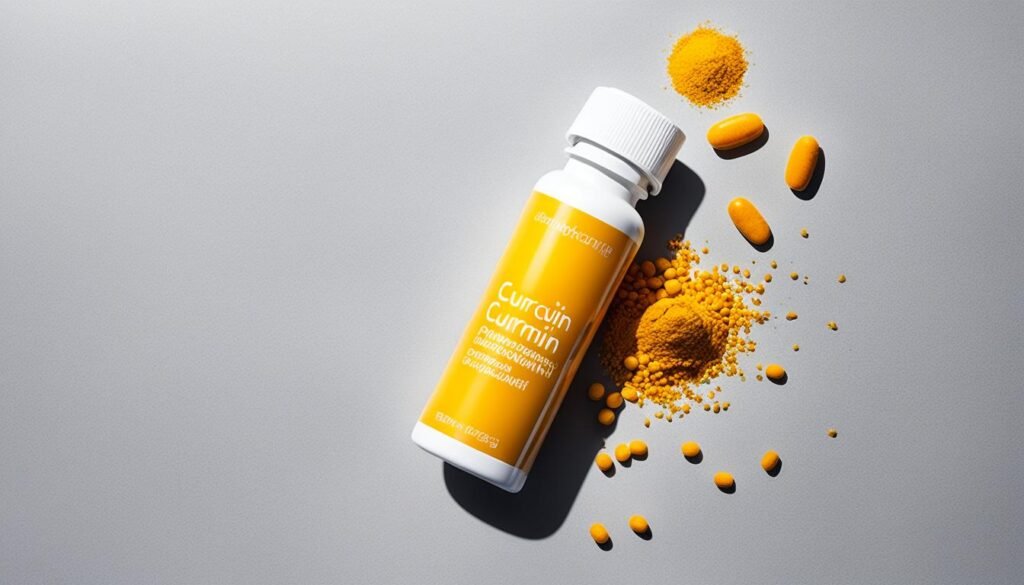
Curcumin, derived from the turmeric root, is a natural compound known for its powerful cellular protective properties. It has gained attention in the field of antiaging due to its ability to activate certain proteins that delay cellular senescence and promote longevity.
Animal studies have shown that curcumin combats cellular damage and increases lifespan. Its antioxidant and anti-inflammatory properties make it a valuable supplement for overall health and wellness.
Curcumin has been found to have numerous benefits, including:
- Reducing oxidative stress
- Improving cognitive function
- Supporting joint health
- Boosting immune function
- Promoting cardiovascular health
In addition to its role in antiaging, curcumin has been studied for its potential in preventing age-related cognitive decline. Consumption of turmeric, a rich source of curcumin, has been associated with a reduced risk of cognitive decline in humans.
To incorporate curcumin into your antiaging routine, consider taking curcumin supplements or adding turmeric to your diet. However, it’s important to note that the bioavailability of curcumin is relatively low, and consuming it with black pepper or fat can enhance absorption.
As with any supplement, it’s recommended to consult with a healthcare professional before adding curcumin to your regimen, especially if you have any underlying health conditions or are taking medications that may interact with it.
Curcumin and its antiaging properties are just one piece of the puzzle when it comes to promoting a healthy and youthful life. Understanding the potential benefits and limitations of curcumin can help you make informed choices in your antiaging journey.
Scientific Studies on Curcumin
“Curcumin has been extensively studied for its antioxidant, anti-inflammatory, and anticancer properties. Its ability to modulate multiple molecular targets makes it a promising candidate for antiaging interventions.”
– Journal of Aging Research
EGCG for Healthy Aging
Epigallocatechin gallate (EGCG) is a polyphenol compound concentrated in green tea. It plays a significant role in supporting healthy aging by improving mitochondrial function.
Green tea intake is associated with a reduced risk of various diseases and mortality. The high concentration of EGCG in green tea provides numerous health benefits.
One of the key benefits of EGCG is its potential to protect against aging skin. The harmful effects of UV light can lead to skin damage, including hyperpigmentation. EGCG has been found to reduce hyperpigmentation caused by UV light exposure.
In addition to its effects on the skin, EGCG also promotes brain health. It stimulates the activation of nerve cells and helps reduce stress.
To visually emphasize the importance of EGCG in green tea, take a look at the table below:
<!– Please use
, ,
| , and | tags for structuring and formatting the content. –>
Incorporating green tea into your daily routine can be a simple yet effective way to enjoy the benefits of EGCG and support healthy aging. Collagen for Skin Aging
Collagen plays a crucial role in maintaining skin structure and elasticity. However, as we age, collagen production slows down, resulting in the formation of wrinkles and fine lines. To combat the signs of aging, many individuals turn to collagen supplements. Supplementing with collagen has been shown to have several benefits for the skin. It helps reduce the appearance of wrinkles and promotes a more youthful complexion. The increased collagen levels in the skin improve hydration, leading to smoother and plumper skin. A study conducted on women aged 35 to 55 found that collagen supplementation led to a significant improvement in skin firmness and elasticity after eight weeks. Another study demonstrated that collagen supplements can enhance nail growth and reduce brittle nails, further highlighting the positive effects of collagen on overall skin health. In addition to supplements, collagen can also be applied topically through creams and serums. However, the effectiveness of topical collagen products in penetrating the skin and providing noticeable results is still a subject of debate among experts. It’s important to note that collagen supplements are not suitable for everyone. Individuals with allergies or dietary restrictions should consult with a healthcare professional before adding collagen to their routine. Benefits of Collagen for Skin Aging:
Please note that individual results may vary, and it is always recommended to consult with a dermatologist or healthcare professional for personalized advice.
Collagen supplements offer a promising approach to combat visible signs of aging and improve overall skin health. Regular use, combined with a healthy lifestyle and skincare routine, can help you achieve a smoother, more youthful complexion. CoQ10 for Antiaging
As we age, it’s important to take proactive steps to maintain our health and vitality. One powerful antioxidant that has been gaining attention in the antiaging world is Coenzyme Q10, or CoQ10. This natural compound plays a crucial role in energy production within our cells and acts as a potent free radical scavenger, protecting our cells from oxidative stress and damage. Supplementing with CoQ10 can have a range of benefits for overall quality of life and specifically for antiaging purposes. By reducing oxidative stress, CoQ10 helps to slow down the aging process at a cellular level, ensuring that our cells stay healthier for longer. This can lead to a reduced risk of age-related diseases and a delay in physical and mental deterioration. One notable area where CoQ10 shines is heart health. The heart is an organ that requires a significant amount of energy to function properly, and CoQ10 plays a critical role in this process. By supplementing with CoQ10, you can support the energy needs of your heart, reduce oxidative stress and inflammation in the cardiovascular system, and potentially lower blood pressure. Here are some key benefits of CoQ10 for antiaging:
Overall, incorporating CoQ10 into your daily routine can have significant positive effects on your antiaging efforts. By reducing oxidative stress, improving energy production, and supporting heart health, CoQ10 helps you age gracefully and maintain your vitality for years to come. Nicotinamide Riboside and Nicotinamide Mononucleotide for Healthy Aging
In the pursuit of healthy aging, two compounds have gained significant attention: nicotinamide riboside (NR) and nicotinamide mononucleotide (NMN). These compounds serve as precursors to a vital coenzyme called NAD+, which plays crucial roles in energy metabolism and DNA repair. NAD+ levels naturally decline with age, and this decline is associated with physical decline and age-related diseases. However, supplementing with NR and NMN has shown promise in restoring NAD+ levels and potentially preventing age-associated genetic changes. Studies have demonstrated that NR and NMN can positively impact age-associated changes at the genetic level. By replenishing NAD+ levels, these compounds support cellular energy production and repair damaged DNA, which can deter the aging process and promote healthy cellular function. The Role of NR and NMN in Restoring NAD+ LevelsBoth nicotinamide riboside and nicotinamide mononucleotide are converted into NAD+ within the body. This conversion is facilitated by specific enzymes that transform these compounds into their active form, promoting their beneficial effects on cellular health. Supplementing with NR and NMN provides the body with an external supply of these precursors, ensuring a consistent availability of NAD+ for crucial cellular processes. By replenishing NAD+, these compounds help combat the age-associated decline in NAD+ levels and support overall health and well-being. To better understand the benefits of NR and NMN supplementation, let’s take a closer look at the effects of NAD+ on age-associated changes.
The Effects of NAD+ on Age-Associated ChangesNAD+ plays a vital role in various biological processes, including energy metabolism, DNA repair, and gene expression. However, NAD+ levels decline naturally with age, which can lead to compromised cellular function and increased susceptibility to age-related diseases. Restoring NAD+ levels through NR and NMN supplementation can have profound effects on age-associated changes. Here are some key ways NAD+ influences the aging process:
By restoring NAD+ levels through NR and NMN supplementation, individuals may experience improvements in energy levels, cellular function, and overall well-being. Additionally, targeting age-associated changes at the genetic level may contribute to the prevention and mitigation of age-related diseases. Comparison of Nicotinamide Riboside and Nicotinamide Mononucleotide
Both nicotinamide riboside and nicotinamide mononucleotide have shown potential in restoring NAD+ levels and combating age-associated changes. While NR has been extensively studied, NMN is a newer area of research, with promising preliminary results. Further research is needed to fully understand the long-term effects and optimal dosages of NR and NMN supplementation. Crocin for Longevity
In the quest for longevity and healthy aging, crocin, a potent pigment found in saffron, has emerged as a remarkable natural compound with numerous health benefits.
Not only does crocin possess anti-inflammatory and anticancer properties, but it also offers protection against age-related nerve damage and skin inflammation caused by exposure to harmful UV light. Saffron, a spice derived from the crocus flower, has been used for centuries in traditional medicine for its therapeutic properties. Crocin, one of the major active constituents of saffron, contributes to its vibrant color and hosts a multitude of health-promoting effects. Studies have shown that crocin possesses remarkable anti-inflammatory capabilities, which can help mitigate the effects of chronic inflammation—an underlying contributor to various age-related diseases.
Moreover, crocin has been shown to exhibit potent antioxidant effects, neutralizing harmful free radicals that contribute to cellular damage and accelerated aging. By protecting cells from oxidative stress, crocin aids in preserving their vitality and functionality, ultimately promoting longevity. Furthermore, crocin shows promise in preventing cognitive decline—a common concern in aging individuals. Its neuroprotective properties and ability to combat oxidative stress in the brain may help preserve cognitive function and reduce the risk of age-related neurodegenerative diseases. As a natural compound, crocin offers a holistic approach to healthy aging. By harnessing its anti-inflammatory, antioxidant, and neuroprotective properties, crocin has the potential to support overall well-being, enhance longevity, and promote a healthy, radiant life. Vitamin C for Healthy Aging
Vitamin C is a vital nutrient that plays multiple roles in maintaining our overall health and well-being. As a powerful antioxidant, vitamin C helps protect our cells from oxidative damage caused by free radicals. It is particularly important for healthy aging, as it supports immune function, regulates inflammation, and promotes skin health. One of the key benefits of vitamin C is its role in boosting immune function. It strengthens the immune system, helping our bodies fend off infections and diseases. By supporting the production of white blood cells, vitamin C enhances our body’s defense mechanisms and aids in the prevention of illnesses. In addition to its immune-boosting properties, vitamin C is also essential for maintaining healthy skin. It promotes the production of collagen, a protein that helps keep our skin firm and youthful. Collagen is crucial for maintaining skin elasticity and preventing the formation of wrinkles. Vitamin C also acts as a potent antioxidant, protecting our skin from the harmful effects of UV radiation and environmental pollutants. Beyond its effects on the immune system and skin health, vitamin C has also been associated with better cognitive performance. Higher levels of vitamin C have been linked to improved cognitive function and a lower risk of cognitive decline. This suggests that vitamin C plays a role in supporting brain health and preventing age-related cognitive impairments. While it is possible to obtain vitamin C through a balanced diet that includes citrus fruits, berries, broccoli, and peppers, some individuals, especially older adults, may need to consider vitamin C supplements if their dietary intake is insufficient. Consulting with a healthcare professional can help determine the appropriate dosage and best course of action for supplementation. To summarize, vitamin C is a crucial nutrient for healthy aging. Its antioxidant properties protect our cells from oxidative damage, its immune-boosting effects support overall health, and its role in skin health contributes to a youthful appearance. Whether obtained through diet or supplements, ensuring an adequate intake of vitamin C is essential for promoting longevity and maintaining optimal well-being. Key Points:
ConclusionTaking skin health vitamins, such as selenium, vitamin E, and vitamin C, along with other supplements like curcumin, EGCG, collagen, CoQ10, and nicotinamide riboside, can support healthy aging and promote youthful skin. These vitamins and compounds protect against oxidative stress, cellular damage, and age-related diseases. Incorporating these supplements into a skincare routine can contribute to a smooth, radiant, and younger-looking complexion. By including selenium, vitamin E, and vitamin C in your daily vitamin intake, you can protect your skin from the harmful effects of the sun and prevent further damage. Selenium guards against skin cancer caused by sun exposure, while vitamin E shields cell membranes and reduces sun damage. Vitamin C repairs free radicals and prevents them from becoming cancerous or accelerating the aging process. In addition to these essential vitamins, other compounds like curcumin, EGCG, collagen, CoQ10, and nicotinamide riboside offer a range of benefits for healthy aging and skin health. Curcumin, found in turmeric, has powerful cellular protective properties, while EGCG, found in green tea, improves mitochondrial function for healthy aging. Collagen supplementation can reduce signs of aging such as wrinkles and dry skin, while CoQ10 provides antioxidant protection and supports heart health. Nicotinamide riboside and nicotinamide mononucleotide can restore NAD+ levels and prevent age-associated genetic changes. By incorporating these skin health vitamins and compounds into your daily routine, you can support your overall health, combat the signs of aging, and achieve a radiant and youthful complexion. Remember to consult with a healthcare professional before starting any new supplement regimen, especially if you have any underlying health conditions or are taking medications. FAQAre there specific vitamins that can help with antiaging and skin health?Yes, there are several vitamins that have been proven to promote healthy skin and slow down the aging process. These vitamins include selenium, vitamin E, and vitamin C. What role does selenium play in skin health?Selenium helps protect the body from skin cancer caused by sun exposure. It also preserves tissue elasticity and slows down the aging and hardening of tissues associated with oxidation. Dietary sources of selenium include whole grain cereals, seafood, garlic, and eggs. How does vitamin E contribute to antiaging?Vitamin E is considered the most important antioxidant in protecting cell membranes and preventing damage to enzymes associated with them. It helps inactivate free radicals, making them less likely to cause damage. Applying vitamin E to the skin can reduce damage caused by sun exposure and limit the production of cancer-causing cells. Natural sources of vitamin E include vegetable oils, grains, oats, nuts, and dairy products. What is the role of vitamin C in antiaging?Vitamin C is the most common antioxidant found in the skin. It is important in repairing free radicals and preventing them from becoming cancerous or accelerating the aging process. Our skin suffers the most from environmental stressors like sun exposure and pollution, which decrease the vitamin C levels in the skin. How can curcumin contribute to healthy aging?Curcumin, the main active compound in turmeric, has powerful cellular protective properties. It activates certain proteins that delay cellular senescence and promote longevity. It also combats cellular damage and increases life span. Turmeric intake is associated with a reduced risk of age-related cognitive decline in humans. What role does EGCG from green tea play in healthy aging?Epigallocatechin gallate (EGCG), a polyphenol compound found in green tea, improves mitochondrial function to support healthy aging. It may protect against aging skin and reduce hyperpigmentation caused by UV light. It also promotes brain health by activating nerve cells and reducing stress. How does collagen impact skin aging?Collagen is a protein that helps maintain skin structure, but its production slows with age, leading to wrinkles. Supplementing with collagen may reduce signs of aging, including wrinkles and dry skin. Studies show that collagen supplements improve skin hydration, elasticity, and nail growth. What are the benefits of CoQ10 for antiaging?Coenzyme Q10 (CoQ10) is an antioxidant that plays a role in energy production and protects against cellular damage. Supplementing with CoQ10 improves overall quality of life, reduces physical and mental deterioration, and benefits heart health. It reduces oxidative stress and lowers blood pressure, improving cardiovascular health. How do nicotinamide riboside and nicotinamide mononucleotide contribute to healthy aging?Nicotinamide riboside (NR) and nicotinamide mononucleotide (NMN) are precursors to NAD+, a compound involved in energy metabolism and DNA repair. NAD+ levels decline with age and are associated with physical decline and age-related diseases. Supplementing with NR and NMN restores NAD+ levels and may prevent age-associated genetic changes. What are the benefits of crocin for longevity?Crocin, a pigment found in saffron, has many health benefits, including anti-inflammatory and anticancer effects. It helps prevent age-related nerve damage and skin inflammation caused by UV light. Crocin may promote longevity and prevent cognitive decline. How does vitamin C contribute to healthy aging?Vitamin C functions as a powerful antioxidant, protecting cells from oxidative damage. It plays important roles in immune function, inflammation regulation, and skin health. Higher vitamin C levels are associated with better cognitive performance. Older adults may need supplements if their diet lacks vitamin C-rich foods. Source Links |
|---|

